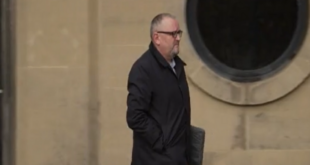Offshore trust loophole hides oligarchs’ cash
- Treasury says it is against identifying beneficiaries of trusts without consultation
- Surprise move follows the introduction of transparency rules
- Offshore firms with property in England and Wales must name ultimate owner
Crooks, kleptocrats and oligarchs will be able ‘to hide from public view’, it is feared, after ministers stalled efforts to close a loophole in a legal crackdown on dirty money.
The surprise move follows the introduction of transparency rules requiring offshore firms with property in England and Wales to name their ultimate owner in a public register of overseas entities.
The UK has led the way in making such registers available at Companies House in a drive to stem organised crime and money laundering.
Ministers have also pledged to tackle the use of shell or ‘front’ companies for financial crime and terrorism by subjecting them to more scrutiny.
But the Treasury has now told peers it is against identifying beneficiaries of secretive trusts without a consultation.
Loophole: The Treasury has told peers it is against identifying beneficiaries of secretive trusts without a consultation
A trust allows those who own a property – the beneficiary – to hide behind the person who manages it for them, the trustee. The Government’s action comes over fears of legal challenges regarding an individual’s right to privacy.
It follows a ruling by the European Court of Justice favouring privacy rights over transparency. The case was brought by Patrick Hansen, a Luxembourg executive who runs a private jet operator that had several planes grounded by sanctions against oligarchs
But former minister Lord Agnew said: ‘The idea that we can tackle illicit finance without proper ownership transparency is for the birds.’
He is tabling an amendment to the Economic Crime Bill to close the ‘gaping loophole’ that will be debated next month. The peer said: ‘This is an opportunity to use our independence to be a leader in transparency and restore our reputation as a clean and fair place to do business.’
Some 29,000 firms have complied with the new register of overseas entities. But more than 5,000 offshore trusts have not named their owners.
‘This consultation could take years,’ said Ben Cowdock of the campaign group Transparency International. ‘All the while criminals and kleptocrats would be able to hide.’
Dame Margaret Hodge, who chairs the All-Party Parliamentary Anti-Corruption Group, said: ‘There shouldn’t be a different set of rules for the powerful who conceal their wealth using murky trusts. Attempts to kick the can down the road will benefit crooks, kleptocrats and oligarchs who might have something to hide.’
Instead of publishing data on trust beneficiaries by default, the Government plans to make it available to groups, such as investigative journalists, in ‘certain circumstances’.
The Department for Business and Trade said the Bill ‘will bear down on kleptocrats, criminals and terrorists’ and strengthen Britain’s reputation as a place ‘where legitimate business can thrive’.
Source link


